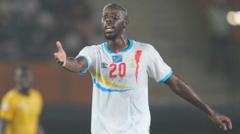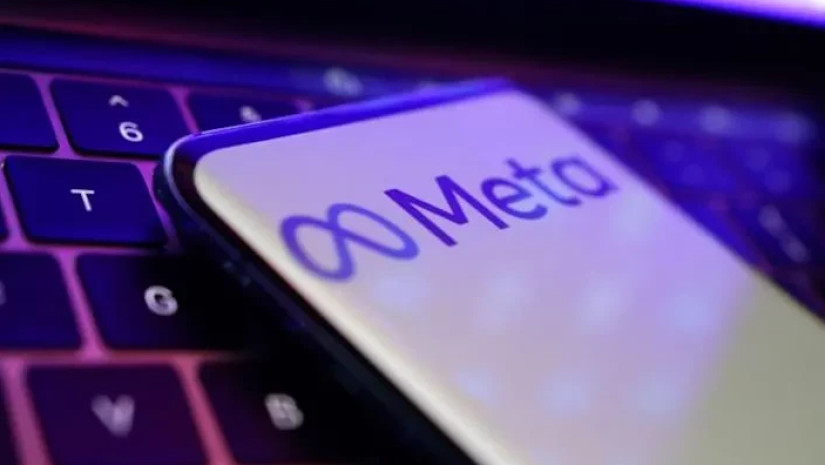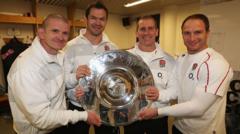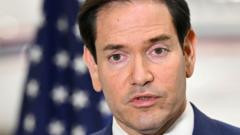How is a Former Peterborough Star Making World Cup Dreams a Reality?

Published: 2025-11-13 08:00:21 | Category: sport
International football is often perceived as a straightforward affair: born in a country, represent that country. However, the reality is more complex, especially for players from nations like the Democratic Republic of the Congo (DR Congo). Gabriel Zakuani, a former professional footballer and now a technical consultant for DR Congo, plays a crucial role in navigating these complexities. His work involves identifying and recruiting players with Congolese heritage, including those who have represented other nations at youth levels, to switch their allegiance to the DR Congo national team.
Last updated: 10 October 2023 (BST)
What’s happening now
As the DR Congo national team prepares for a World Cup play-off semi-final against Cameroon and the Africa Cup of Nations, the role of Gabriel Zakuani has become increasingly significant. His efforts to recruit players with Congolese heritage, like Premier League talents Aaron Wan-Bissaka and Yoane Wissa, highlight a growing trend among national teams to tap into the global diaspora for talent. This approach not only bolsters the national squad but also reflects the broader shifts in international football, where heritage can often dictate national representation.
Key takeaways
- Gabriel Zakuani is actively recruiting players with Congolese heritage for the DR Congo national team.
- High-profile players like Aaron Wan-Bissaka and Yoane Wissa have switched their national allegiance to DR Congo.
- The DR Congo team benefits from a large diaspora of Congolese players in Europe, enhancing their competitiveness.
Timeline: how we got here
The evolution of international player recruitment for nations like DR Congo has been gradual, marked by significant milestones:
- 1970s-1980s: Political and economic instability in Zaire (now DR Congo) leads to a significant emigration of Congolese citizens, including athletes.
- 2005: Gabriel Zakuani plays for the DR Congo national team, marking the beginning of his involvement in football at the international level.
- 2020: Zakuani retires from playing and begins to focus on talent identification and recruitment for the national squad.
- 2023: The DR Congo national team prepares for World Cup play-offs and the Africa Cup of Nations, featuring players who have previously represented other nations.
What’s new vs what’s known
New today/this week
Recent efforts by Zakuani have brought attention to the potential of players like Wan-Bissaka and Wissa, who have made the switch to represent DR Congo. This transition reflects a broader strategy to strengthen the national team by leveraging the diaspora.
What was already established
Historically, DR Congo has faced challenges in competing internationally due to a lack of resources and infrastructure. However, recent years have seen improvements in training facilities and the introduction of more players with experience in competitive leagues, making the national team more formidable.
Impact for the UK
Consumers and households
The implications of this recruitment strategy extend beyond football. As UK households with Congolese heritage follow the progress of players like Wan-Bissaka and Wissa, it fosters a sense of cultural pride and identity. Additionally, the visibility of these athletes may influence the younger generation to engage more with football and aspire to represent their heritage on an international stage.
Businesses and jobs
For businesses, particularly those in sports management and talent scouting, Zakuani's role underscores a growing market for services that connect players with their heritage. This trend could lead to new opportunities in sports consultancy, representation, and recruitment, particularly for firms focused on the African diaspora.
Policy and regulation
The recruitment of players with dual nationality or heritage raises questions around eligibility rules in international football. As more players consider switching allegiances, governing bodies like FIFA may need to review existing regulations to accommodate this evolving landscape.
Numbers that matter
- 30: Number of international caps Gabriel Zakuani earned while representing DR Congo.
- 5–10: Estimated number of players with Congolese heritage currently playing in top European leagues.
- 2: Number of Premier League players (Wan-Bissaka and Wissa) who have switched their international allegiance to DR Congo recently.
Definitions and jargon buster
- Dual nationality: The status of being a citizen of two different countries.
- Diaspora: The dispersion of any people from their original homeland.
- Allegiance: Loyalty or commitment to a nation or team.
How to think about the next steps
Near term (0–4 weeks)
As the World Cup play-offs approach, DR Congo's squad selections will be closely watched. Zakuani's efforts may lead to last-minute inclusions of newly recruited players, which could impact team dynamics and performance.
Medium term (1–6 months)
The outcomes of the Africa Cup of Nations will be pivotal for DR Congo's footballing reputation. Success could inspire more players of Congolese heritage to consider representing the national team.
Signals to watch
- Performance of the national team in upcoming international fixtures.
- Media coverage of player recruitment efforts by Zakuani and other consultants.
- Potential changes in eligibility rules by FIFA regarding nationality switches.
Practical guidance
Do
- Encourage young players with heritage to consider international representation.
- Engage with community discussions about identity and national representation.
- Support initiatives that promote cultural pride in sports.
Don’t
- Discourage players from exploring their heritage in relation to national teams.
- Assume that nationality should solely dictate a player's international allegiance.
Checklist
- Identify potential players with Congolese heritage in your local area.
- Research the eligibility rules for international football representation.
- Attend community events that celebrate Congolese culture and heritage.
Risks, caveats, and uncertainties
The recruitment of players based on heritage can lead to contested narratives around national identity. Some may argue that players should exclusively represent the country of their birth. Additionally, changes in FIFA regulations could impact the ease with which players switch allegiances, creating uncertainty for both players and national teams.
Bottom line
Gabriel Zakuani's work in recruiting players with Congolese heritage for the DR Congo national team highlights the complexities of identity in modern football. As the national team prepares for key matches, the involvement of high-profile players could significantly elevate their competitiveness and inspire future generations. This trend may redefine how nations approach talent identification and representation in international football.
FAQs
What is Gabriel Zakuani's role with the DR Congo national team?
Gabriel Zakuani serves as a technical consultant, focusing on identifying and recruiting players with Congolese heritage who may represent the national team.
How have players like Aaron Wan-Bissaka switched their national allegiance?
Players like Wan-Bissaka have switched their allegiance due to various factors, including lack of opportunities with their birth nation and encouragement from family and former players.
Why is the diaspora important for DR Congo's football?
The diaspora provides a pool of talent with Congolese heritage, allowing the national team to enhance its competitiveness by incorporating skilled players from Europe.



